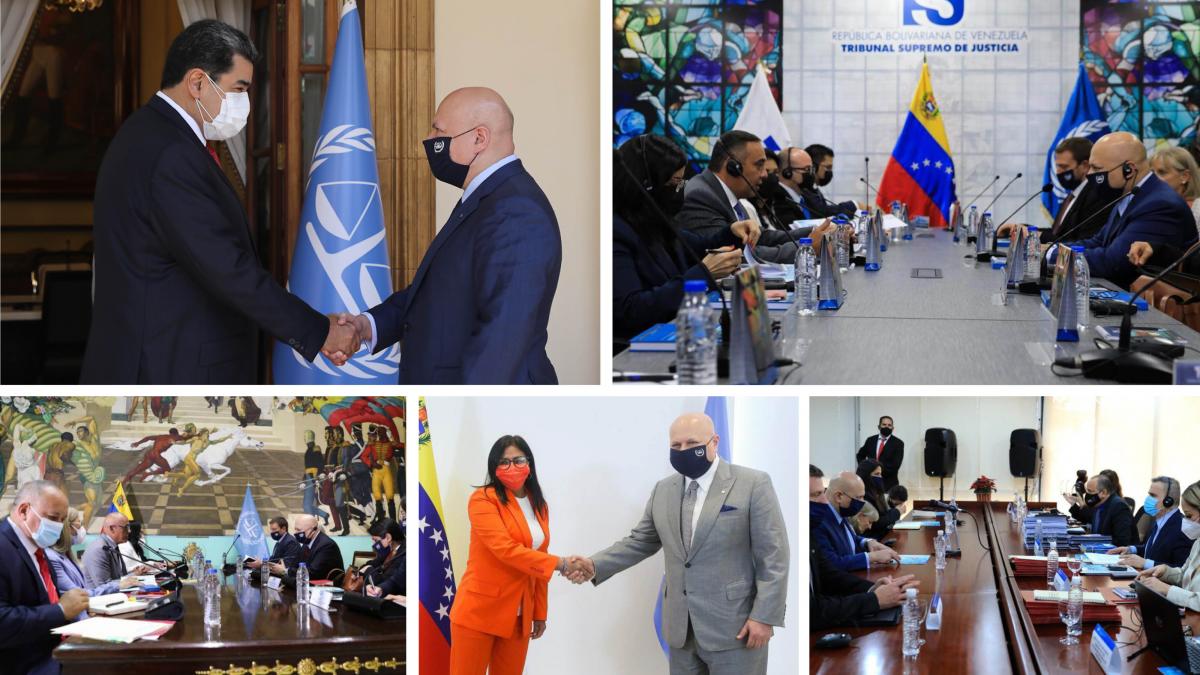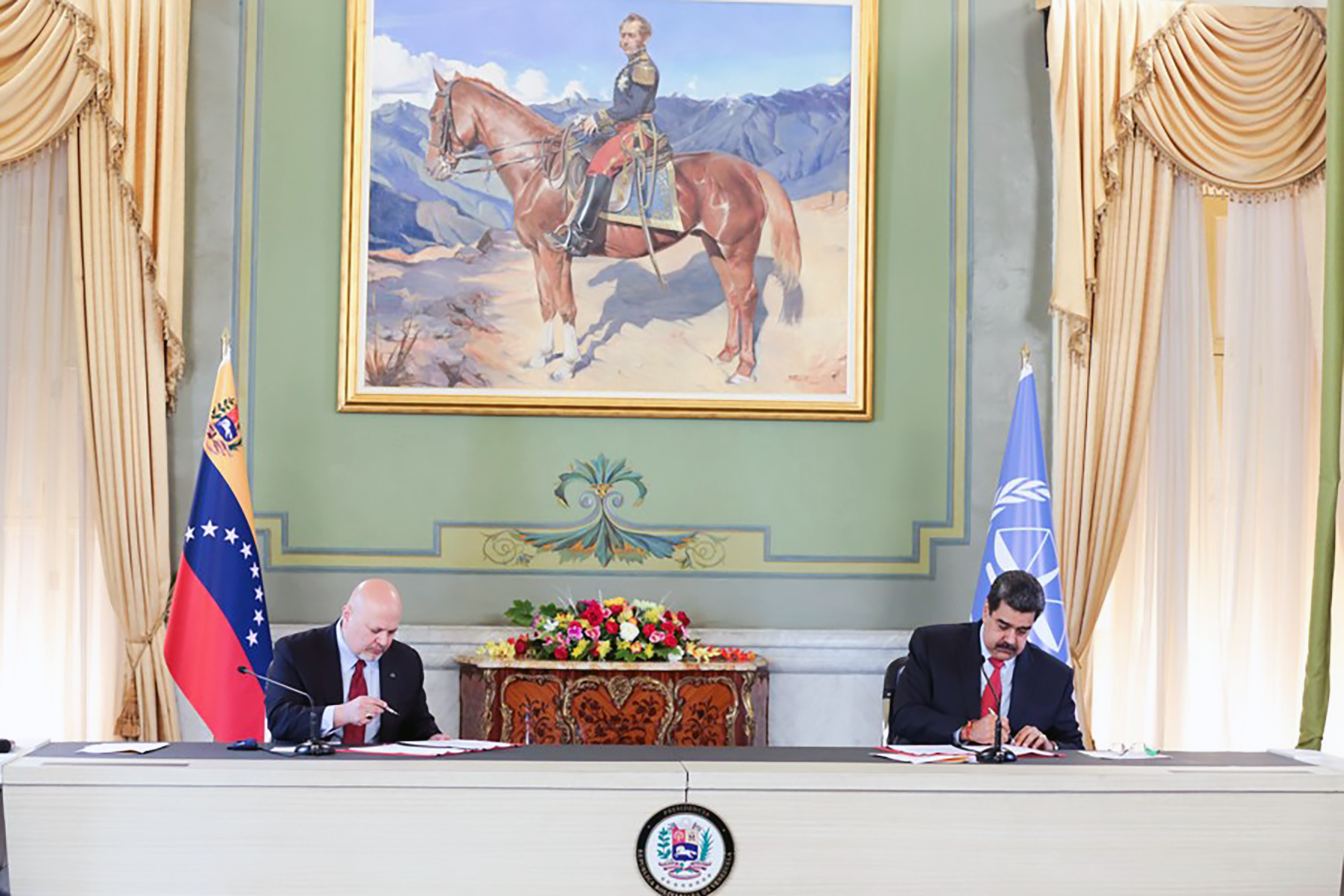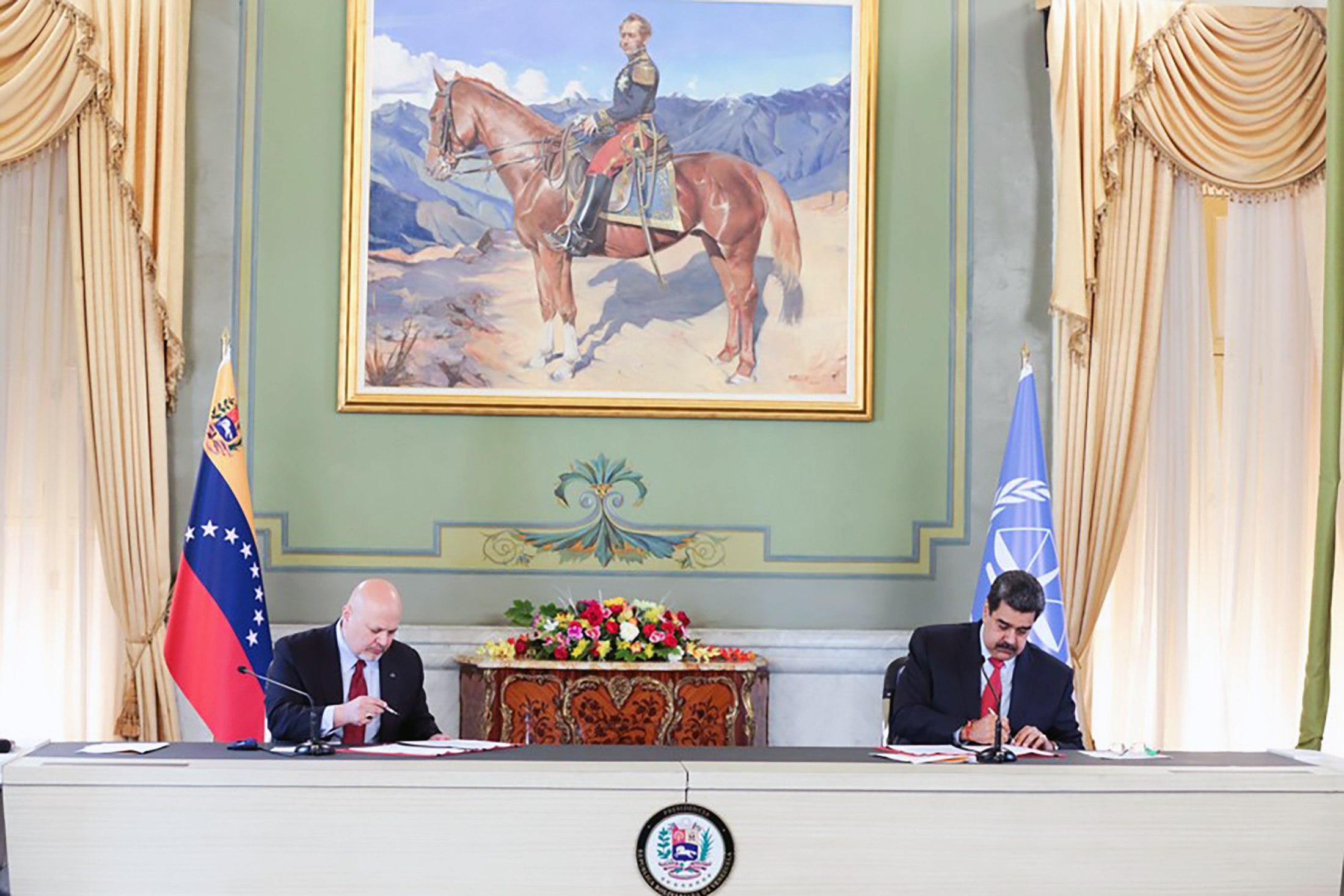ICC Prosecutor, Mr Karim A.A. Khan QC, opens an investigation into the Situation in Venezuela and concludes Memorandum of Understanding with the Government

I have just returned to The Hague from a productive mission to Caracas, in the Bolivarian Republic of Venezuela. Between 31 October 2021 to 3 November 2021, I held constructive and candid discussions with senior Government officials, members of the diplomatic corps and representatives of civil society.
I express my gratitude to the authorities of Venezuela for their official invitation and for engaging with my delegation and myself in what was a short but meaningful schedule. As far as Government officials are concerned, my delegation and I met multiple times with the Vice-President and also with the Minister of Foreign Affairs of the Republic. In addition, we held meetings with the Attorney General, the President of the Supreme Tribunal, the Ombudsman, the President of the National Assembly and other State Officials.
It was particularly notable that the President of the Republic, H.E. Mr Nicolás Maduro Moros engaged with me directly over three days in meetings totalling almost 10 hours. Whilst the discussions were candid, they were at all times courteous and conducted in a constructive spirit. I extend my thanks to the President, other officials and stakeholders for engaging with my delegation and I in this manner throughout our visit.
Since assuming office as Prosecutor of the International Criminal Court ("ICC" or the "Court"), I have been reviewing the assessment reached under my predecessor, while also continuing to seek a meaningful dialogue with the Venezuelan authorities in order to maintain and deepen cooperation as envisaged under the Rome Statute.
Venezuela ratified the Rome Statute on 7 June 2000, and has since been a State Party. The Office of the Prosecutor ("the Office") opened a preliminary examination into the Situation in Venezuela in February 2018. A few months later, on 27 September 2018, the Office received a referral from a group of States Parties to the Rome Statute requesting the initiation of an investigation for crimes against humanity allegedly committed in the territory of Venezuela.
As I have repeatedly stated, preliminary examinations should not go on for inordinately long periods of time, and must come to a conclusion as soon as the criteria under the Rome Statute have been properly assessed on the basis of the best information available.
There are sometimes misunderstandings as to what a preliminary examination is – and what it is not. It is, therefore, important to underline that the preliminary examination process is a filtering mechanism. No investigations have, as yet, been conducted in Venezuela by my Office. There are no targets or suspects at this stage of the proceedings. It is only through opening a formal investigation, however, that the truth can be determined. In this regard, I emphasised in my various meetings in Caracas, that article 54(1)(a) of the Rome Statute requires my Office to investigate incriminating and exculpatory circumstances equally in order to establish the truth.
The investigation – now opened – is not a one-way road. It is only the start of a process.
The Government of Venezuela was of the view that the conditions for an investigation have not been met. Despite this, I consider it to their great credit that they have committed to co-operate with my Office as we move to this new stage. I have been invited back to Venezuela as have members of my Office. In parallel with the investigation we will now commence, I will continue to look for meaningful ways to cooperate and engage with the authorities and all other stakeholders in the search for the truth.
My Office will support any sincere and meaningful effort undertaken by the Venezuelan Government to reform and revitalise the justice and penal system in order to enable genuine accountability in Venezuela for the victims of alleged crimes. The principle of complementarity is the foundation of the Rome Statute system and it remains an important principle during the investigation stage.
Evidence of the constructive and sustained level of engagement with the Venezuelan authorities during my time in Caracas finds form in the joint signing of a Memorandum of Understanding (MoU) on 3 November 2021, at the Presidential Palace. This MoU sets the stage for sustained dialogue and cooperation as we move to the next phase in this situation. As the MoU makes clear and as I have stated publicly, the preliminary examination into the Situation in Venezuela (Venezuela I) has come to a close following a thorough and independent process with a finding that there is a reasonable basis to proceed with an investigation.

I am reassured and pleased that by signing this MOU, Venezuela and my Office are committed to working collaboratively, while also independently and impartially, but with full regard to the principle of complementarity, and to pursue cooperation and mutual assistance. This is the best way to promote the values and principles of the Rome Statute.
Lastly, whilst we are not unaware of the political discourse and fault lines in Venezuela or of the regional context, it is important that space be given to my Office to do its work. We will do our work independently and devoid of any political agenda. We work as officers of the Court pursuant to the values and principles of the Rome Statute. As I have previously stated, we will take a rather dim view of any attempt to use the opening of the investigation for political gain or to politicise the independent work of my Office.
We must be principled enough to encourage and support any individual or authority that moves closer to the law and the principles of the Rome Statute. In the end, with patience, cooperation and determined professionalism, the truth will be established. I request patience and support whilst this process now progresses in its next stage.
-
Memorandum of Understanding between the Bolivarian Republic of Venezuela and the Office of the Prosecutor of the International Criminal Court:
English | Español
The Office of the Prosecutor of the ICC conducts independent and impartial preliminary examinations, investigations and prosecutions of the crime of genocide, crimes against humanity, war crimes and the crime of aggression. Since 2003, the Office has been conducting investigations in multiple situations within the ICC's jurisdiction, namely in Uganda; the Democratic Republic of the Congo; Darfur, Sudan; the Central African Republic (two distinct situations); Kenya; Libya; Côte d'Ivoire; Mali; Georgia, Burundi; Bangladesh/Myanmar, Afghanistan (pending judicial authorization to resume investigation following initial article 18 deferral request) Palestine and the Philippines. The Office is also currently conducting preliminary examinations relating to the situations in Bolivia; Guinea and Venezuela II; and has completed its preliminary examinations of the situations in Ukraine and Nigeria, which are pending requests to seek authorisation to proceed to investigation.
Acabo de volver a La Haya al término de una productiva misión en Caracas, República Bolivariana de Venezuela. Del 31 de octubre al 3 de noviembre de 2021 mantuve deliberaciones constructivas y francas con funcionarios gubernamentales de alto rango, miembros del cuerpo diplomático y representantes de la sociedad civil.
Expreso mi agradecimiento a las autoridades de Venezuela por su invitación oficial y por los contactos mantenidos con mi delegación y con mi persona en el marco de una agenda corta pero significativa. Por lo que se refiere a los funcionarios gubernamentales, mi delegación y yo nos reunimos en varias ocasiones con el Vicepresidente y con el Ministro de Relaciones Exteriores de la República. Además, celebramos reuniones con el Fiscal General, el Presidente del Tribunal Supremo de Justicia, el Defensor del Pueblo, el Presidente de la Asamblea Nacional y otros funcionarios del Estado.
Cabe destacar en particular que el Presidente de la República, el Excmo. Sr. Nicolás Maduro Moros, interactuó directamente conmigo a lo largo de tres días en el marco de reuniones que duraron en total casi 10 horas. Aunque las deliberaciones fueron francas, en todo momento fueron cordiales y obedecieron a un espíritu constructivo. Doy las gracias al Presidente,& a otros funcionarios y partes interesadas, por haber interactuado de esta manera con mi delegación y conmigo durante toda nuestra visita.
Desde que empecé a desempeñar el cargo de Fiscal de la Corte Penal Internacional ("CPI" o "Corte"), he estado evaluando las conclusiones alcanzadas por mi predecesora sin dejar de seguir buscando un diálogo genuino con las autoridades venezolanas a fin de mantener y profundizar la cooperación prevista en el Estatuto de Roma.
Venezuela ratificó el Estatuto de Roma el 7 de junio de 2000 y desde entonces ha sido Estado Parte del mismo. La Fiscalía abrió un examen preliminar en la situación en Venezuela en febrero de 2018. A los pocos meses, el 27 de septiembre de 2018, la Fiscalía recibió una remisión de un grupo de Estados Partes del Estatuto de Roma solicitando la apertura de una investigación por crímenes de lesa humanidad presuntamente cometidos en el territorio de Venezuela.
Como he repetido en varias ocasiones, los exámenes preliminares no deberían prolongarse excesivamente, sino llegar a su término tan pronto como se hayan evaluado debidamente los criterios previstos en el Estatuto de Roma sobre la base de la mejor información disponible.
A veces surgen malentendidos con respecto a lo que es, y lo que no es, un examen preliminar. En consecuencia, es importante subrayar que el examen preliminar es un mecanismo de filtración. Hasta la fecha, mi Fiscalía no ha realizado investigaciones en Venezuela. No existen ni objetivos ni sospechosos en la fase actual de las actuaciones. Sin embargo, la veracidad de los hechos solo puede determinarse mediante la apertura de una investigación formal. A este respecto, en mis diversas reuniones celebradas en Caracas recalqué que el artículo 54, párrafo 1 a), del Estatuto de Roma exige a mi Fiscalía investigar tanto las circunstancias incriminantes como las eximentes a fin de establecer la veracidad de los hechos.
La investigación, que ya se ha abierto, no es un camino de dirección única: es solo el punto de partida de un proceso.
El Gobierno de Venezuela valoraba que no se cumplían las condiciones para abrir una investigación. Pese a ello, considero que se les debe dar gran reconocimiento a que se hayan comprometido a cooperar con mi Fiscalía en el inicio de esta nueva etapa. Se nos ha invitado, a mí y a varios miembros de la Fiscalía, a volver a Venezuela. En paralelo a la investigación que vamos a poner en marcha, seguiré buscando maneras genuinas de cooperación e interacción con las autoridades y con todas las partes interesadas en búsqueda de la verdad.&
Mi Fiscalía respaldará todo esfuerzo sincero y significativo emprendido por el Gobierno de Venezuela para reformar y revitalizar el sistema penal y de justicia a fin de establecer una rendición de cuentas genuina en Venezuela a favor de las víctimas de presuntos crímenes. El principio de complementariedad es el fundamento del sistema del Estatuto de Roma y continuará siendo un principio importante durante la fase de la investigación.&
Prueba del carácter constructivo y sostenido de la interacción mantenida con las autoridades venezolanas durante mi estancia en Caracas es la firma conjunta el 3 de noviembre de 2021 de un
Memorándum de Entendimiento en el Palacio Presidencial. Este Memorándum de Entendimiento sienta las bases para un diálogo y cooperación sostenible mientras avanzamos a la siguiente fase de esta situación. Como deja claro el Memorándum, y como he declarado públicamente, el examen preliminar de la situación en Venezuela (Venezuela I) llega a su término luego de un proceso exhaustivo e independiente por medio del cual se ha concluido que existe fundamento suficiente para abrir una investigación.&
 El Sr. Karim A.A. Khan QC, Fiscal de la CPI, y el Excmo. Sr. Nicolás Maduro Moros, Presidente de Venezuela, durante la ceremonia de firma del Memorándum de Entendimiento el miércoles 3 de noviembre de 2021
El Sr. Karim A.A. Khan QC, Fiscal de la CPI, y el Excmo. Sr. Nicolás Maduro Moros, Presidente de Venezuela, durante la ceremonia de firma del Memorándum de Entendimiento el miércoles 3 de noviembre de 2021Me reconforta y me complace que con la firma de este Memorándum de Entendimiento, Venezuela y mi Fiscalía se comprometen a trabajar en colaboración de forma independiente e imparcial, pero con pleno respeto al principio de complementariedad, y a la búsqueda de la cooperación y la asistencia mutua. Esta es la mejor manera de promover los valores y principios del Estatuto de Roma.
Por último, aunque no desconocemos el discurso político y las divisiones imperantes en Venezuela ni el contexto regional, es importante que mi Fiscalía cuente con el espacio necesario para realizar su labor. Nuestra labor tendrá lugar de forma independiente y al margen de toda agenda política. Actuamos como funcionarios de la Corte de conformidad con los valores y principios del Estatuto de Roma. Como he declarado antes, no veremos con buenos ojos ningún intento de servirse de la apertura de la investigación para obtener beneficios políticos o politizar la labor independiente de mi Fiscalía.
Debemos ser firmes en nuestros principios para alentar y apoyar a toda persona o autoridad que se aproxime a la ley y a los principios del Estatuto de Roma. En último término, con paciencia, cooperación y profesionalidad decidida se determinará la veracidad de los hechos. Pido paciencia y apoyo mientras que este proceso entra en una nueva fase.&
- Memorándum de Entendimiento entre la República Bolivariana de Venezuela y la Fiscalía de la Corte Penal Internacional: English & |& Español
La Fiscalía de la CPI lleva a cabo exámenes preliminares, investigaciones y enjuiciamientos independientes e imparciales de los crímenes de genocidio, crímenes de lesa humanidad, crímenes de guerra y el crimen de agresión. Desde 2003 realiza investigaciones en varias situaciones que son de la competencia de la CPI, como en Uganda, la República Democrática del Congo, Darfur (Sudán), la República Centroafricana (dos situaciones distintas), Kenya, Libia, Côte d’Ivoire, Malí, Georgia, Burundi, Bangladesh/Myanmar, el Afganistán (en espera de autorización judicial para reanudar la investigación tras una solicitud inicial de suspensión de conformidad con el artículo 18), Palestina y Filipinas. La Fiscalía también lleva a cabo actualmente exámenes preliminares en relación con las situaciones en Bolivia, Guinea y Venezuela II, y ha ultimado sus exámenes preliminares de las situaciones en Ucrania y Nigeria, que están pendientes de la solicitud de autorización para proceder a la investigación.